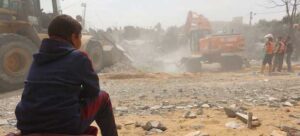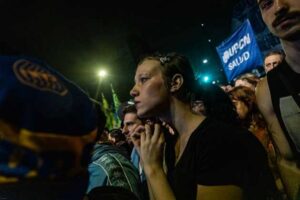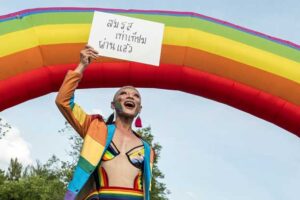
Armed Conflicts, Civil Society, Featured, Global Governance, Headlines, Human Rights, Middle East & North Africa, TerraViva United Nations

A child watches as bodies are recovered from under the rubble of a house in the Al-Nasr neighborhood, east of the city of Rafah, in the southern Gaza Strip. Credit: UN News/Ziad Taleb
– The US gun lobby justifies the unfettered American gun ownership in the US on a misguided premise: Guns don’t kill people, it’s bullets that kill people.
The accusations of genocide and war crimes in Gaza have been directed firstly, at Israel, for the killings of more than 37,700, mostly civilians, and over 86,000 injured, in retaliation for the 1,200 killed by Hamas last October, according to estimates from Gaza health officials, as cited by Cable News Network (CNN) last week.
And secondly, the blame is also squarely on the United States, the unrestrained supplier of arms, including the devastating 2,000-pound unguided bombs, to the Netanyahu government.
But a group of UN human rights experts is now blaming a third force: US arms manufacturers who are accused of implicitly killing people, along with financial institutions that fund most of these weapons suppliers.
“The transfer of weapons and ammunition to Israel may constitute serious violations of human rights and international humanitarian laws and risk State complicity in international crimes, possibly including genocide, the UN experts said last week, reiterating their demand to stop transfers immediately.”
In line with recent calls from the Human Rights Council, the UN experts are calling for halt to the sale, transfer and diversion of arms, munitions and other military equipment to Israel by US arms manufacturers – including BAE Systems, Boeing, Caterpillar, General Dynamics, Lockheed Martin, Northrop Grumman, Oshkosh, Rheinmetall AG, Rolls-Royce Power Systems, RTX, and ThyssenKrupp.
The experts say these defense contractors should also end transfers, even if they are executed under existing export licenses.
“These companies, by sending weapons, parts, components, and ammunition to Israeli forces, risk being complicit in serious violations of international human rights and international humanitarian laws,” the experts said.
This risk is heightened by the recent decision from the International Court of Justice (ICJ) ordering Israel to immediately halt its military offensive in Rafah, having recognised genocide as a plausible risk, as well as the request filed by the Prosecutor of the International Criminal Court (ICC) seeking arrest warrants for Israeli leaders on allegations of war crimes and crimes against humanity.
“In this context, continuing arms transfers to Israel may be seen as knowingly providing assistance for operations that contravene international human rights and international humanitarian laws and may result in profit from such assistance.”
Dr Ramzy Baroud, a journalist and Editor of The Palestine Chronicle, told IPS the UN experts’ statement is important, as it highlights the complex role of the US in supporting, sustaining, and benefiting from the Israeli genocide in Gaza.
“Quite often we call on, demand and implore the US to end its support of Israel, so that the genocide may come to an end. The experts, however, are reminding us that the US involvement is not confined to that of the White House, and direct or indirect US military and logistical support to Israel”, he pointed out.
Indeed, he said, US support is channeled through multiple players, those who manufacture, transport, assemble and maintain the weapons and munition — a multi-billion-dollar military machine that has harvested the lives of tens of thousands of Palestinians.
These companies must be named, shamed, boycotted and held accountable in every possible way. They must understand that there are legal repercussions to their action, as they are complicit in the Israeli crimes against the Palestinians, said Dr Baroud, a Non-resident Senior Research Fellow at the Center for Islam and Global Affairs (CIGA).
These companies are, as the experts said, ‘knowingly’ providing direct assistance to Israel in its genocidal war. They are fully aware of the extent of these crimes as articulated in the South African case against Israel at the ICJ, and the call for arrest warrants by the chief prosecutor of the ICC.
The next rational step is for these companies to be taken to task. They seem to have no moral threshold. Their quest for profits by far exceeds their concern that their weapons are killing thousands of children, women and civilians in Gaza, and throughout occupied Palestine. They must face justice as participants in the Israeli genocide in Gaza, declared Dr Baroud.
Norman Solomon, executive director, Institute for Public Accuracy, told IPS it’s difficult to draw any clear distinction between the U.S. government and the arms makers that sell to it.
“The two are so intertwined that differentiating between them is often a distinction without a difference. The revolving door for individuals, in both directions, places weapons executives in pivotal government positions and vice versa”.
The magnitude of the military profits, he pointed out, is overwhelming in the nation’s political economy and culture. The multibillion-dollar corporations that depend on selling weaponry to the government are directly participating in a routine process of literally making a killing on behalf of massive profit-taking.
To call these firms “defense contractors” is a misnomer, since what they sell has little to do with defense in any meaningful sense, he argued.
“The stepped-up weapons sales and gifts to Israel are continuations of a partnership between the U.S. government and arms suppliers with the purpose of aiding an ally and reaping still more massive profits. In tandem, the U.S. government and the companies are providing Israel with the means to continue mass murder of Palestinian civilians in Gaza. The core of the problem is lack of democracy and vastly excessive corporate power”.
In moral terms, the culpability is far-reaching. Yet, in a sinister way, he said, the military contractors are doing what capitalism provides for them to do — seek to maximize profits regardless of the consequences for human beings and the natural environment.
In contrast, within a democratic system, government is supposed to be responsive to the informed consent of the governed — conditions that certainly do not exist in the United States.
Meanwhile, in terms of international law and human decency, the U.S. government and its arms suppliers are guilty of horrendous crimes, which assist and compound those of Israel, declared Solomon, who is also national director, RootsAction.org and author of, “War Made Invisible: How America Hides the Human Toll of Its Military Machine”
A report from the Human Rights Council in mid-June details six emblematic attacks involving the suspected use of GBU-31 (2,0000 lbs), GBU-32 (1,000 lbs) and GBU-39 (250 lbs) bombs from 9 October to 2 December 2023 on residential buildings, a school, refugee camps and a market.
The UN Human Rights Office verified 218 deaths from these six attacks, and said information received indicated the number of fatalities could be much higher.
“The requirement to select means and methods of warfare that avoid or at the very least minimise to every extent civilian harm appears to have been consistently violated in Israel’s bombing campaign,” said High Commissioner for Human Rights Volker Türk.
The report says the series of Israeli strikes, exemplified by the six incidents, indicates that the IDF may have repeatedly violated fundamental principles of the laws of war. In this connection, it notes that unlawful targeting when committed as part of a widespread or systematic attack against a civilian population, in line with a State or organisational policy, may also implicate the commission of crimes against humanity.
Financial institutions investing in these arms companies are also called to account. Investors such as Alfried Krupp von Bohlen und Halbach-Stiftung, Amundi Asset Management, Bank of America, BlackRock, Capital Group, Causeway Capital Management, Citigroup, Fidelity Management & Research, INVESCO Ltd, JP Morgan Chase, Harris Associates, Morgan Stanley, Norges Bank Investment Management, Newport Group, Raven’swing Asset Management, State Farm Mutual Automobile Insurance, State Street Corporation, Union Investment Privatfonds, The Vanguard Group, Wellington and Wells Fargo & Company, are urged to take action.
Failure to prevent or mitigate their business relationships with these arms manufacturers transferring arms to Israel could move from being directly linked to human rights abuses to contributing to them, with repercussions for complicity in potential atrocity crimes, the experts said.
“Arms initiate, sustain, exacerbate, and prolong armed conflicts, as well as other forms of oppression, hence the availability of arms is an essential precondition for the commission of war crimes and violations of human rights, including by private armament companies,” said the experts.
The experts paid tribute to the sustained work of journalists who have been documenting and reporting on the devastating impact of these weapons systems on civilians in Gaza, and human rights defenders and lawyers, among other stakeholders, who are dedicated to holding States and companies accountable for the transfer of weapons to Israel.
IPS UN Bureau Report













